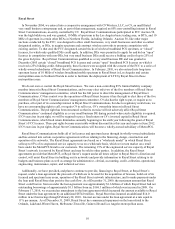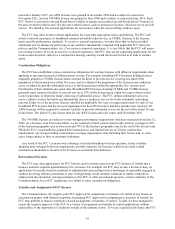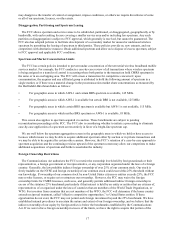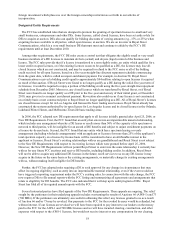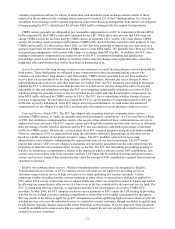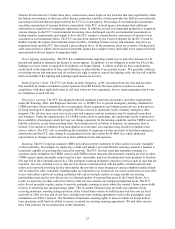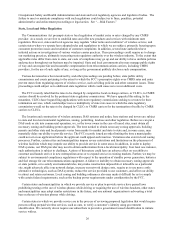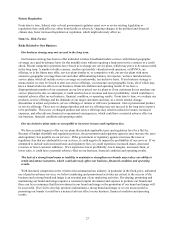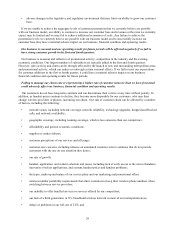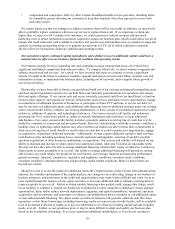Metro PCS 2009 Annual Report Download - page 32
Download and view the complete annual report
Please find page 32 of the 2009 Metro PCS annual report below. You can navigate through the pages in the report by either clicking on the pages listed below, or by using the keyword search tool below to find specific information within the annual report.20
Spectrum allocated for 700 MHz previously was occupied by analog television broadcast licensees and currently
is occupied by certain wireless microphone users. By federal law, all existing analog television broadcast licenses
were obligated to vacate the 700 MHz spectrum by the digital television transition date, or June 12, 2009, without
any reimbursement from 700 MHz licensees. The FCC also has ruled that all wireless microphone users are
obligated to vacate the 700 MHz currently allocated for wireless services by June 12, 2010, but this order is not yet
final. Licensees granted 700 MHz licenses are not obligated to pay for the relocation of wireless microphones from
the 700 MHz band.
E-911 service. The FCC requires CMRS providers to implement basic 911 and enhanced, or E-911, emergency
services. Our obligation to implement these services is incurred in stages on a market-by-market basis as local
emergency service providers become equipped to handle E-911 calls. E-911 services allow state and local
emergency service providers to better identify and locate wireless callers, including callers using special devices for
the hearing impaired. The network equipment and handsets we utilize are capable of meeting the FCC’s E-911
requirements and we have constructed facilities to implement these capabilities in markets where we have had
requests from local public safety emergency service providers. Because we employ a handset-based location
technology, the FCC also has rules that require us to ensure that specified percentages of the handsets in service on
our systems are location capable and meet certain location accuracy standards. The FCC actively monitors the
compliance by CMRS carriers with E-911 requirements. The FCC has in the past and may in the future, impose
substantial fines and forfeitures on wireless broadband mobile carriers for their failure to comply with the FCC’s E-
911 rules and could impose other sanctions, including revocation of licenses or the imposition of mandatory
reporting requirements, license conditions, and compliance programs. The FCC also has rules under which wireless
broadband mobile carriers may be required to offer priority E-911 services to the public safety agencies under
certain circumstances. States in which we do business may limit or eliminate our ability to recover our E-911 costs.
The FCC is considering various alternative proposals for wireless E-911 Phase II location accuracy and reliability
and an FCC order currently is circulating. These E-911 requirements may require us to expend additional capital and
resources.
Communications assistance for law enforcement act (CALEA). Federal law requires CMRS carriers to assist law
enforcement agencies with lawful wiretaps, and imposes wiretap-related record-keeping and personnel-related
obligations. Historically, our customer base may have been, and may continue to be, subject to a greater percentage
of law enforcement requests than those of other carriers and, as a result, our compliance expenses may be
proportionately greater.
Number administration. Because demand is increasing for a finite pool of telephone numbers, the FCC has
adopted number pooling rules that govern how telephone numbers are allocated. Number pooling is mandatory
inside the wireline rate centers that are located in counties included in the top 100 MSAs. We have implemented
number pooling procedures and support pooled number roaming in all of our metropolitan areas which are in the top
100 MSAs. The FCC also has authorized states to supplement federal numbering requirements in certain respects
and some of the states where we provide service have been authorized by the FCC to engage in limited numbering
administration. Our ability to access telephone numbers on a timely basis is important for our ability to continue to
grow our business.
Number portability. The FCC has ordered all telecommunications carriers, including CMRS carriers, to support
telephone number portability which enables subscribers to keep their telephone numbers when they change
telecommunications carriers, whether wireless to wireless or, in some instances, wireline to wireless, and vice versa.
Under these local number portability rules, a CMRS carrier located in one of the top 100 MSAs must have the
technology in place to allow its customers to keep their telephone numbers when they switch to a new carrier.
Outside of the top 100 MSAs, CMRS carriers receiving a request to allow end users to keep their telephone numbers
must be capable of doing so within six months of the request. All CMRS carriers are required to support nationwide
roaming for customers retaining their numbers.
Interconnection. FCC rules provide that all telecommunications carriers are obligated upon reasonable request to
interconnect directly or indirectly with the facilities and networks of other telecommunications carriers. All LECs
also must, upon request, enter into mutual or reciprocal compensation arrangements with CMRS carriers for the
exchange of intra-MTA traffic, under which each carrier compensates the other for terminated intra-MTA traffic
originating on the compensating carrier’s network. Further, at a CMRS carrier’s request, incumbent local exchange
carriers must exchange intra-MTA traffic with CMRS carriers at rates based on the FCC’s costing rules or rates set
by state public utility commissions applying the FCC’s rules. CMRS carriers also have an obligation to engage in


